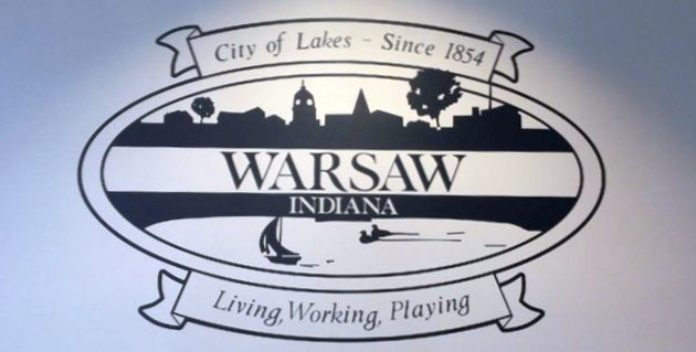The city of Warsaw violated Indiana’s Open Door Law, but it did not violate the Access to Public Records Act (APRA).
Luke H. Britt, Indiana public access counselor, released his findings Tuesday in response to formal complaints from local resident Chad Zartman.
In his complaint filed July 18, Zartman alleged the city violated the Open Door Law when the Board of Works voted via email on matters related to the alleyway revitalization project and that the city violated APRA when it did not release the names of anonymous donors to the project.
The alley project is between City Hall and Oak & Alley/Three Crowns Coffee and includes decorative paving, seating and art. If the city could raise $50,000 for the project through Patronicity.com, the Indiana Housing & Community Development Authority would provide a $50,000 grant for it. By the May 5 deadline, the city raised over $56,000.
On May 17, Zartman made a public records request to the city for records of all alley donations. Of those 100-plus donations, 16 were anonymous and totaled $2,150. The city refused to identify the anonymous donors, relying on Indiana Code 5-14-3-4(b)(15), which allows the identity of donors to remain anonymous upon request.
To obtain matching funds for the alleyway project from the IHCDA’s CreatINg Places grant, a project assistance agreement needed to be approved and signed by Mayor Joe Thallemer to present to the Board of Works. The board’s approval was solicited over email rather than a public meeting, and Zartman contended this was a final action akin to a vote.
“Other email evidence appears to show that other final actions have been taken over email as well by utilizing a ‘reply-all’ approach to approve certain items,” Britt’s findings state.
On Jan. 23, city assistant planner Justin Taylor emailed Josh Boren of Boren Builders for an accurate estimate of the alley project, according to copies of the emails. Boren provided a proposed cost of $65,650 on Feb. 11. On May 8, Taylor emailed Boren asking if he could put a proposal together that “has enough material costs taken out (to) make the contract less than 50K.”
Taylor stated the city needs the contract to be below $50,000 so it doesn’t have to be bid out.
On May 9, Taylor emailed Board of Works members Jeff Grose, Thallemer, George Clemens and City Planner Jeremy Skinner that, to have IHCDA process the $50,000 grant for the alleyway project, the agreement with CreatINg Places needs to be approved and signed. The agreement was going before the Board of Works May 22; “however, if there is a way to get a verbal approval from the board members and have Joe sign it we can send it to IHCDA sooner,” Taylor emailed.
That same day, Thallemer and Grose emailed they approved it. Clemens approved it May 10 via email from Paris, France.
Boren emailed Taylor May 11 to let him know that by removing several items, the alleyway proposal amount could be reduced to $47,450. On May 30, Taylor emailed Clemens, Grose and Thallemer, telling them that the proposal from Boren for project will total $47,400. All three men emailed back that they “approve.”
The city has since conceded this was an inappropriate way of approaching approvals and clarified its intent was not to obfuscate or hide issues, but was done out of convenience and efficiency, Britt wrote.
Britt also wrote that technology has made it too easy for public employees and officials to take advantage of gaps and loopholes in access laws to find shortcuts to doing business, with email being one of those mechanisms. “While communicating over email can be a useful tool for the dissemination of information, public officials must be mindful not to take final action over emails,” Britt wrote.
After Britt spoke with Thallemer, Britt wrote that he is “confident” the city will be mindful of the Open Door Law going forward.
“This is good for the citizens of Warsaw because no longer will voting taking place behind closed doors and no longer will there be (an effort) to lower the price of a contract to avoid the public bid process. It creates more transparency,” Zartman said Wednesday morning.
APRA states that “providing persons with information is an essential function of a representative government and an integral part of the routine duties of public officials and employees, whose duty it is to provide the information. The city is a public agency for the purposes of APRA,” Britt wrote, “therefore any person has the right to inspect and copy the city’s disclosable public records during regular business hours unless the records are protected from disclosure as confidential or otherwise exempt under the APRA. A public agency is required to make a response to a written request that has been mailed within seven days after it is received.”
Under APRA, Britt wrote, a public agency has the discretion to shield the identity of an anonymous donor if the donor requests it.
When Britt was made aware of the city’s arrangement with Patronicity, he advised Zartman that the names were disclosable “if the city had a record of the donors’ identity.” This was the first instance of a crowdsourcing arrangement Britt had encountered.
Zartman said that when he and former city councilman Kyle Babcock learned Britt had changed his findings on the anonymous donors because of state law pointed out to Britt by city attorney Mike Valentine, “We realized we didn’t have the smoking gun we thought we had.”
“Whether the legislature intended anonymous crowdsourcing for public works projects as part of Indiana Code is subject to debate, but withholding those names does fall within the letter of the law,” Britt wrote, though he did not begrudge Zartman for being skeptical.
“Therefore, while the city does not appear to have erred in applying Indiana Code in this instance, I encourage public agencies to withhold names of anonymous donors sparingly, and only where absolutely necessary, to avoid the perception of impropriety,” Britt wrote.
After reading Britt’s findings, Thallemer emailed the following response:
“The city is pleased with the ruling by the public access counselor that the list of anonymous donors, protected by state statute, shall remain confidential. Those donations, representing a very small portion (less than 4%) of the total donated funds, were given under the condition of anonymity. With nothing other than ‘skepticism,’ the allegations of impropriety were ill founded.
“With regard to the open door law, the city has maintained a practice of seeking prior approval of issues with time sensitivity, a practice that was previously statutorily approved and followed by the last two administrations. Those decisions have always been publicly and openly ratified at subsequent Board of Works meetings. The ruling against that practice is the result of an opinion handed down a few years ago by the public access counselor. We have adjusted our procedures to reflect that ruling,” he continued.
“I will also reiterate that the acceptance of the alleyway activation project by our donors, by our citizens, and by the Indiana Housing and Community Development Authority has been gratifying. Our process was open and followed state statutes. Deliberating early to accept the state grant and then ratifying that acceptance at the next Board of Works meeting was a procedural error that had absolutely no impact on the outcome or propriety of the project,” Thallemer stated.
As for possible consequences of the findings, in a telephone interview with Britt in July, he said, “Ninety percent of the time it’s a public affairs consequence… It becomes bad press and not a lot of politicians like that.”
If someone wants to take it further than that, Britt said someone could use his findings in a court case if they filed a lawsuit.





